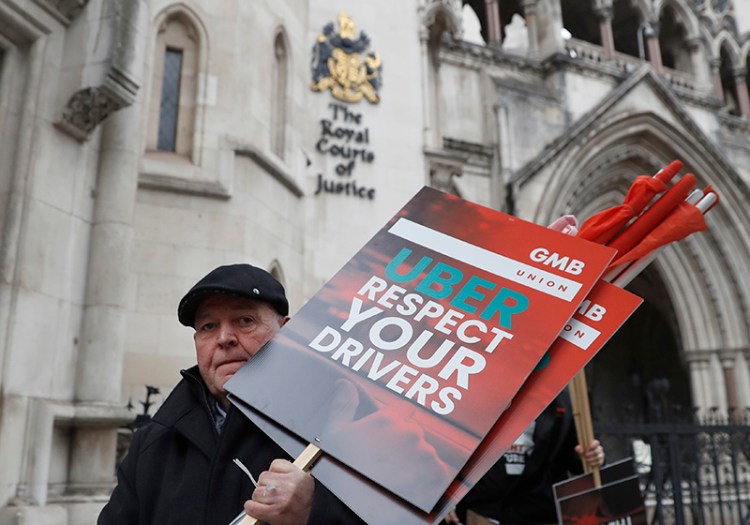Uber Technologies lost a U.K. lawsuit over the employment rights of its drivers, in a landmark judgment that threatens to force companies in the country’s burgeoning gig economy to offer benefits such as paid vacations.
London’s Court of Appeal dismissed a challenge Wednesday by the ride-hailing firm over a lower court ruling that found its drivers are “workers,” meaning they’re entitled to the minimum wage and holiday pay. It’s the third time Uber has been defeated in the British lawsuit. The company will now take the case to the Supreme Court, a spokeswoman said.
The company’s drivers “are under a positive obligation to be available for work while the app is on,” and that’s enough to class them as workers, according to a statement released by the court. Judges Terence Etherton and David Bean agreed that the drivers were workers, while Nicholas Underhill dissented.
“The ruling will have significant implications for approximately 45,000 Uber drivers and, more broadly, individuals engaged across the so-called gig economy,” Paul Jennings, the lawyer representing the drivers who brought the suit against Uber, said in a statement. “We anticipate that thousands of drivers will now seek to make substantial back-dated claims.”
The court’s decision doesn’t reflect most drivers’ reasons for using the ride-hailing app, Uber’s spokeswoman said. “If drivers were classified as workers they would inevitably lose some of the freedom and flexibility that comes with being their own boss.”
Uber had drawn up “convoluted, complex and artificial contractual arrangements” that were “no doubt formulated by a battery of lawyers,” Etherton and Bean said in the 70-page ruling. Drivers and passengers aren’t in a position to resist the language of the contracts, they said.
Underhill, who said he would’ve allowed Uber’s appeal, said in the judgment that “the relationship argued for by Uber is neither unrealistic nor artificial.”
At stake is an issue at the center of the gig economy: the employment status of its participants. Uber Chief Executive Officer Dara Khosrowshahi told reporters in October, ahead of the appeal court hearing, that the lawsuit covers a matter that’s “at the core of the service.”
The case is another major battle in the U.K. for Khosrowshahi, now in his second year on the job, as Uber prepares to stage one of the largest IPOs of all time. Investors have been anxious to see him succeed on a repeat of a charm offensive taken during his first year, which in June helped win Uber a 15-month probationary license to keep operating in London after Transport for London — the city’s transit authority — concluded it wasn’t “fit and proper” to hold a license.
Drivers are their own boss, and their contract with the firm is essentially a licensing agreement to use the app, Uber’s lawyer Dinah Rose had argued during the hearing.
James Farrar, one of the drivers spearheading the suit, said they shouldn’t have to choose between employment rights and the flexibility that comes with the work. The drivers don’t claim to be “employees,” a category that would’ve given them even more rights such as parental leave.
“This is the perfect early Christmas present for GMB’s Uber members, but this case is about the wider ‘gig economy’ too,” Tim Roache, general secretary of the GMB union that helped bring the original case, said in a statement. “Employers are on notice that they can’t just run roughshod over working people to put more on the bottom line for shareholders.”
It’s the latest in a series of British judgments in favor of employment rights. The U.K.’s top court ruled in June that Pimlico Plumbers should have treated a tradesman as a worker, giving him the right to vacation pay and to sue the company. In May, the U.K. car service Addison Lee lost an appeal in a case over drivers’ rights, and in 2017 a London employment tribunal found a cycle courier working for CitySprint UK was a worker.
“We’re now at a hat trick of judgments against Uber,” Roache said. “They keep appealing and keep losing. Uber should just accept the verdict and stop trying to find loopholes that deprive people of their hard won rights and hard earned pay.”
Send questions/comments to the editors.


